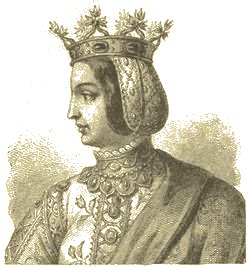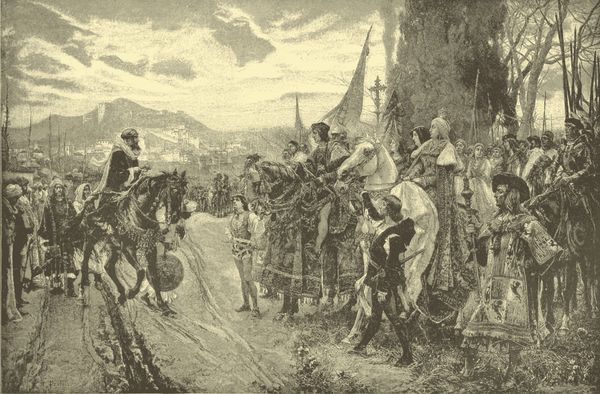| Isabella of Castile (1451-1504) |
| www.studenthandouts.com ↣ Historical Figures ↣ "I" Names ↣ Isabella of Castile (1451-1504) |
 Isabella I of Castile, born on April 22, 1451, in Madrigal de las Altas Torres, Spain, was one of the most significant and influential monarchs in Spanish history. Her marriage to Ferdinand II of Aragon in 1469 united the two powerful kingdoms of Castile and Aragon, laying the foundation for the unification of Spain under their joint rule.
Isabella I of Castile, born on April 22, 1451, in Madrigal de las Altas Torres, Spain, was one of the most significant and influential monarchs in Spanish history. Her marriage to Ferdinand II of Aragon in 1469 united the two powerful kingdoms of Castile and Aragon, laying the foundation for the unification of Spain under their joint rule.
Isabella’s reign began in 1474, following a civil war over the succession of the Castilian throne. Her decisive victory secured her position as queen and demonstrated her strong leadership abilities. Together with Ferdinand, Isabella embarked on a series of reforms to strengthen royal authority, streamline the administration, and reduce the power of the nobility. They worked to centralize their government, enhance the judicial system, and improve the financial stability of their kingdoms. One of Isabella's most notable achievements was the completion of the Reconquista, the centuries-long effort to expel the Moors from the Iberian Peninsula. The fall of Granada in 1492, the last Muslim stronghold in Spain, marked the end of this campaign and solidified Isabella's legacy as a staunch defender of Christianity.  Isabella is also remembered for her support of Christopher Columbus's 1492 voyage, which led to the discovery of the New World. This monumental event initiated the era of Spanish exploration and colonization, greatly expanding Spain's influence and wealth.
Isabella is also remembered for her support of Christopher Columbus's 1492 voyage, which led to the discovery of the New World. This monumental event initiated the era of Spanish exploration and colonization, greatly expanding Spain's influence and wealth.
However, Isabella's reign was not without controversy. In 1478, she and Ferdinand established the Spanish Inquisition to enforce religious uniformity. The Inquisition targeted converted Jews (conversos) and Muslims (Moriscos), as well as heretics, leading to widespread persecution and forced conversions. In 1492, they issued the Alhambra Decree, expelling all Jews from Spain, a decision that had lasting negative impacts on Spanish society and economy. Isabella of Castile died on November 26, 1504, but her legacy endures. Her reign significantly shaped the future of Spain, leaving a complex heritage of both remarkable achievements and controversial policies. She is remembered as a powerful and determined queen who played a pivotal role in the formation of modern Spain. |
| www.studenthandouts.com ↣ Historical Figures ↣ "I" Names ↣ Isabella of Castile (1451-1504) |








